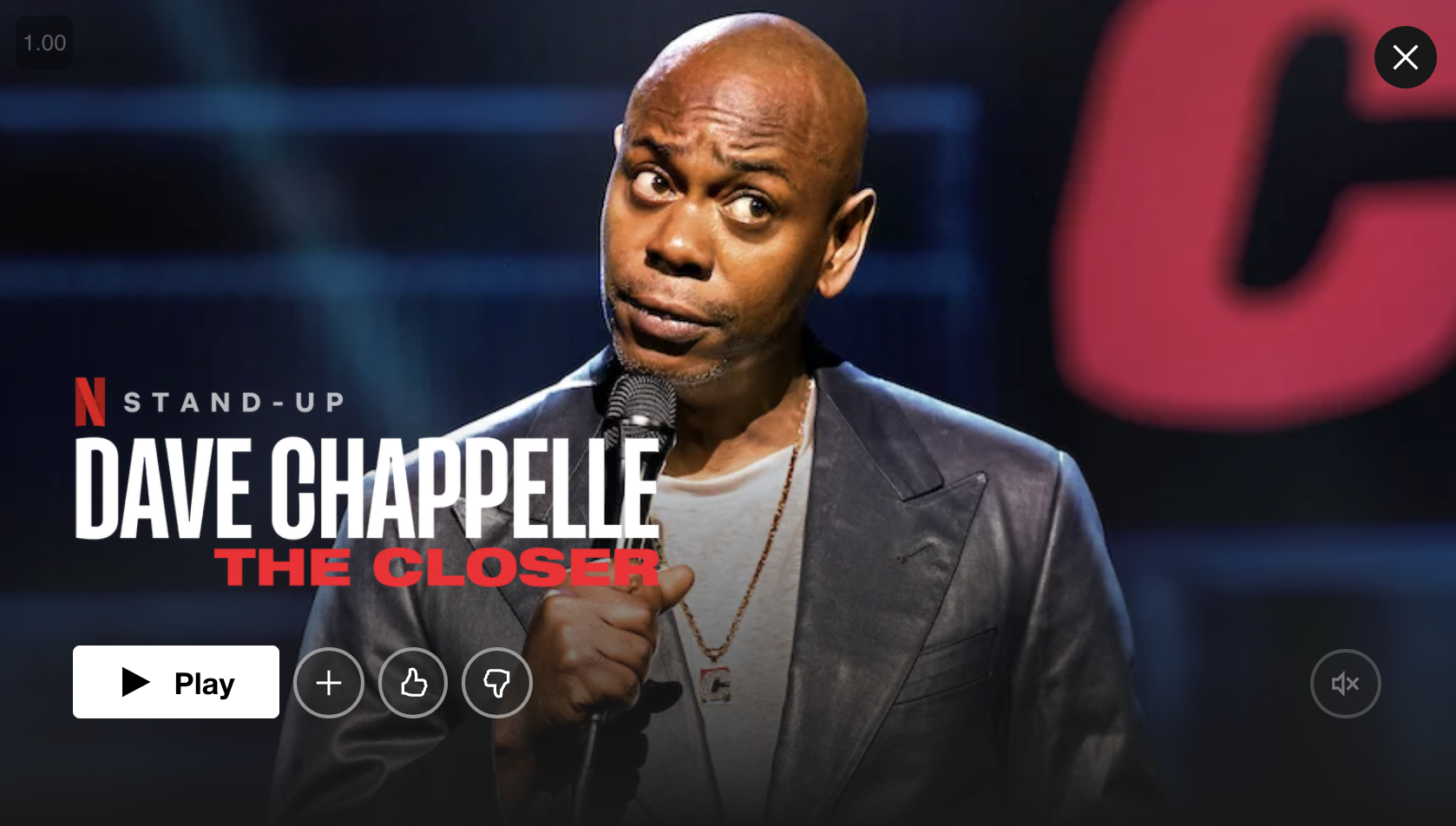The Closer: Dave Chappelle’s pathetic attempt at being woke
Chappelle’s new controversial comedy special paints a depressing portrait of a legendary comedian spiralling down the “cancel culture” conspiracy.
CW: suicide and transphobia
What made Dave Chappelle such a compelling comedian was how he used comedy to make people examine the flaws of society. Since his last special, Sticks & Stones (2019), the world has been in an uproar. From a pandemic to Black rights protests to the U.S. elections, people felt lost and confused. When Chappelle released a new Netflix special, people relied on him to comment on everything. However, The Closer showed how Chappelle failed to adjust to the ever-changing world.
Chappelle is considered one of the greatest comedians of all time. He rose to stardom in the ’90s through his hilarious stand-up acts. He ran a popular sketch comedy show called Chappelle’s Show, which aired from 2003 to 2006, and parodied aspects of American society, such as race relations. After quitting the show, Chappelle disappeared from the spotlight for a decade. He made his comeback after signing a multi-million-dollar contract with Netflix in 2016 and went on to release five comedy specials on their platform—most received critical acclaim and awards. The Closer, as the name suggests, is the final installment of his Netflix catalogue.
The Closer began with Chappelle recounting his experience with Covid-19, but then he spent the next hour beating a dead horse. Controversies were nothing new to Chappelle; his past Netflix specials received criticism over his mockery of the LGBTQ2S+ community. Chappelle’s motto lately is that he does not care about the backlash his jokes receive. However, it is clear he does care, as he filled more space in his acts by addressing controversies.
The Closer centred around the LGBTQ2s+ community’s obsession with “cancelling” Chappelle and how they should not get upset over his silly jokes. Even worse, the points he made in this special have already been established in his past specials, making The Closer a snooze fest. The special ended on a tragic note; Chappelle told the story of his transgender friend who committed suicide over the harassment she received online from the LGBTQ2S+ community for defending Chappelle’s trans jokes. Chappelle repeatedly praised her ability to take a joke.
At the height of its popularity, Chappelle left Chappelle’s Show because he felt his racial humor was feeding racism instead of challenging it. Does he not acknowledge that his repeated jokes about the LGBTQ2S+ community might fuel bigotry?
Despite being labelled as a comedy, The Closer barely offered that. When there were jokes, Chappelle punched below his weight. Chappelle talked about these same controversial topics in the past, but they stung less before with his clever and witty punchlines. The Closer lacked that brilliance, as he littered it with cheap, predictable jokes that an edgy 15-year-old would make.
The Closer gave more ammo to the tiring war between artistic freedom of speech and “cancel culture.” Chappelle has joined the legion of aging comedians that cannot shut up about how they are not able to tell the same jokes they did 20 years ago. These entertainers paint themselves as brave philosophers that go against the grain, and if they dare tell certain jokes or truths, a tsunami of liberal tears will wash away their careers. They depict “cancel culture” (a vocal minority on Twitter) as a boogeyman to shield themselves from the criticism of their mediocre bits that poke fun at minorities.
In the special, Chappelle gave two examples of celebrities that were “cancelled” by the LGBTQ2s+ community. One was rapper DaBaby, who was dropped from performing at several festivals due to his unprovoked homophobic rant on stage at Rolling Loud this past summer. Another example was how comedian Kevin Hart was removed from hosting the 2019 Oscars after the resurfacing of old homophobic tweets. “Taking a man’s livelihood is akin to killing him,” Chappelle said dramatically.
Chappelle made it seem like DaBaby and Hart were strapped to a time machine and transported back to The Great Depression, where they were forced to travel around on trains to find honest pay. In reality, DaBaby quickly bounced back by landing a feature on Kanye West’s highly anticipated album Donda and dropped a music video for his new single “Lonely,” which featured rap legend Lil Wayne and has 20 million views. After the Oscars controversy, Hart still starred in several blockbuster films.
If anything, these examples show that if you have clout and a simpering fanbase, the only “cancelling” you will get is outrage on social media that will fizzle out in a week. Do not worry, Chappelle, millions will still tune in to the next special featuring your rants about how cancel culture accidentally spilled its coffee on you.
Is The Closer a genius marketing scheme to generate clicks for Netflix? Or is Chappelle just a rich old man who is disconnected from reality? At the beginning of the special, Chappelle said that he will stop doing stand-up indefinitely. Unfortunately, that was the most exciting part.
Associate Sports Editor (Volume 50) — Bilaal is in his fourth year working towards a double major in Biology and Psychology and a minor in Professional Writing & Communication. When Bilaal isn’t procrastinating doing his assignments, you can catch him singing along to early 2000s RnB, watching Seinfeld, or coming up with absurd satire pitches he can get away with.



The problem with this article is twofold:
Your use of LGBTQ2S+ is offensively outdated
Dave Chappelle’s opinions about Trans people and “cancel culture” are in line with most liberals, moderates & all conservatives. His retread of “Sticks & Stones” is not an accident: The protest against it was hypocritical in 2019 given the range of content on Netflix that would promote real world violence (any realistic looking acts of violence are more able to desensitize people than bland jokes). The argument about the size of his potential audience is meaningless when compared to the violence and explicit sex on display in the Netflix catalog bringing in hundreds of billions of minutes a year.
The concept of cancel culture is about the collective effort to deplatform someone for speech that was/is broadly acceptable in the time period by a small, energized group. Using the failures as an effort to prove that there is no cancel culture is like using the times a lion does not catch its Prey as proof that lions do not exist.